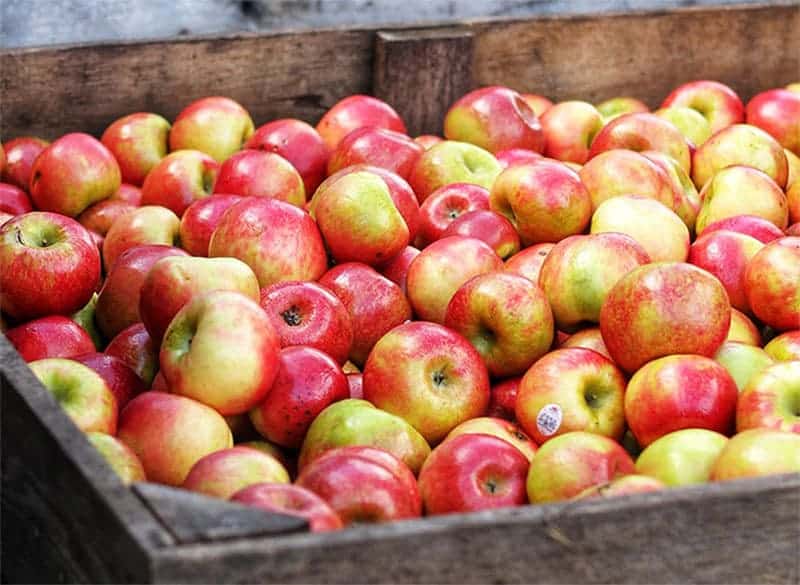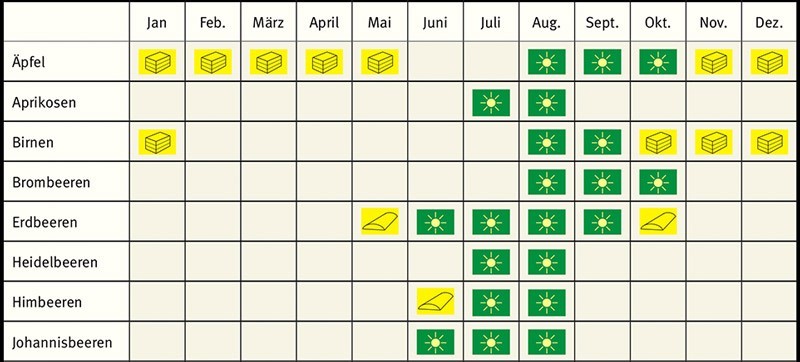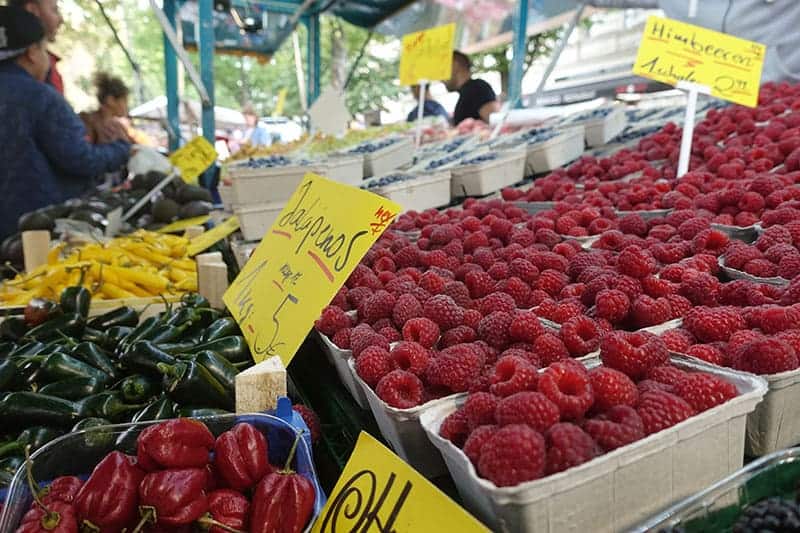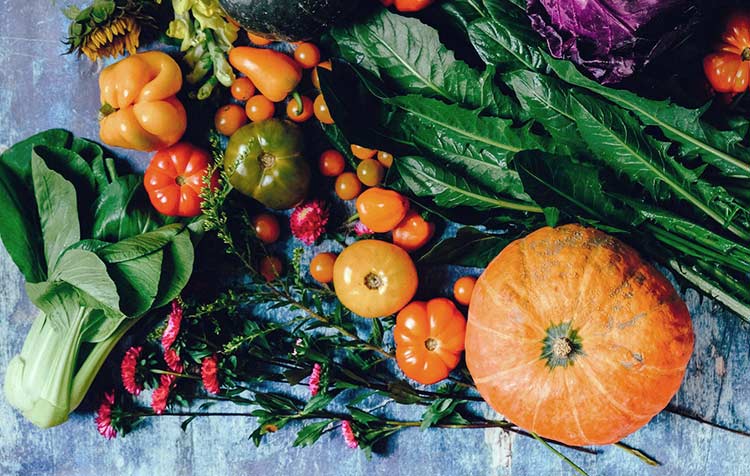Do you also want more food seasonal shopping? Then this is a very good attitude. Because, in principle, every fruit and vegetable is available all year round these days, although they have their own season. Sweet cherries, for example, you can buy seasonally from June to August - the rest of the year they make a European trip from Spain or Turkey. New Zealand apples travel halfway around the world to be sold in Germany - although apples are produced here year-round.
In this article, I want to show you how to get healthier, better quality food by shopping seasonally and, by the way, save the Protect climate and Save money sustainably can. From the definition, benefits and effects to the seasonal calendar and the most important tips.
Notice: About the regional shopping I have written a separate article for you. You can read it by clicking on the link.
What does seasonal shopping mean?
Buying seasonally means consciously choosing the Consume food that grows in the natural and seasonal conditions of your country's agriculture or can be produced.
Example: Broccoli is in season in Germany from mid-May to mid-December.₁ This means that you can buy it seasonally during this period, as the conditions for growing broccoli locally are very good. In February you will also find broccoli in the supermarket, but then it can not be seasonal.
Advantages & disadvantages of seasonal shopping

So we have defined the topic of seasonality. But to what extent does the seasonal consumption now has advantages with it? And how does my change in behavior towards more seasonality possibly also work to my disadvantage? To make sure you always know why you prefer foods that grow in your area at the right time of year, I would like to compare the advantages and disadvantages in more detail here.
Disadvantages of seasonal shopping
You have to look a little longer for real disadvantages. What's wrong with supporting the local economy, eating healthy food and protecting the environment at the same time? Heartily little. Nevertheless, here are a few things that should be fairly included as disadvantages of seasonality:
- Seasonal calendar necessary: If you've been consuming seasonally long enough, you already have the seasonal calendar in your head - for all newbies, it's usually a bit of a chore at the beginning to always take another look at it.
- Food is seasonal: Those who consume seasonally have good reasons for doing so. Nevertheless, it has to be said that many foods are not available all year round. On the other hand, this can also be seen positively as "automatic variety".
- Specialization and year-round often more economical: As a result, farms do not have the chance to specialize in a particular foodstuff - the expenses for different machines and more far-reaching know-how are therefore higher, for example.
Advantages of seasonal shopping
The few disadvantages, are counterbalanced by heavyweight advantages. Here are some examples of why it pays to focus on seasonal foods:
- Lower prices: Strawberries, for example, are available as outdoor products from June to September. During this period, a lot of strawberries are produced. The high supply also ensures lower prices at the same time, so that you can save money through sustainability simply by following your heart.
- Protects the climate: Seasonal shopping is one of many, valuable Climate protection tips, as the production of food out of season is only possible with a high consumption of energy and water.
- Promotes its own region: By favoring foods that are produced seasonally near you, you're also supporting the economy of your own neighborhood. A stronger economy attracts more businesses - maybe even your future employer? Nothing is impossible.
- Healthier and tastier food: In greenhouses, food can also be produced out of season - unfortunately often with the use of artificial fertilizers and pesticides. The corresponding foods naturally come into contact with them. In addition, strawberries, asparagus and the like lose nutritional content and flavor when they are not actually in season.
- Future generations understand the connections better: Yes, that is also an advantage of seasonal consumption. In our globally networked world, where apples from New Zealand are sold in Germany, an understanding of the connection between agriculture and one's own food can sometimes fall behind.
- Promote small farmers, slow down food corporations: Food corporations are focused on producing quickly in order to sell as much as possible. Small farmers, on the other hand, usually produce more consciously and prefer quality over quantity. Here, the combination of seasonal and regionally produced food is particularly valuable.
Another advantage I would like to mention is that you automatically prevent yourself from buying food that has been treated abroad with a pesticide that is permitted there, but for which there is a ban on use in Germany.₂
So what are the implications?
Here I'm not referring to not consuming seasonally, but rather making sure you're really buying seasonally. If you consciously pay attention to seasonality in your food shoppingYou'll be supporting the local economy and ensuring that children continue to understand the connection between the food on their plates and the land next door. You also benefit from lower prices within a season - for food that is simply healthy and incredibly tasty. Almost as a side effect, you're also helping the global warming against. So what speaks against it?
In any case, not buying seasonally at all has the opposite effect.
Seasonal shopping calendar

Before I go straight to the clear tips, here you will find the important basis for sustainable seasonal shopping: This Seasonal calendar of the consumer center.₃
With the help of the seasonal calendar, you can find out, for example, when which food is especially climate-friendly as a free-range product is available. You can also see when food is offered as a stock item or when it is produced only with a tarpaulin or by using little energy. You should especially stay away from those foods that can only grow in permanently heated greenhouses during a particular season.
Tip: The You can download the seasonal calendar of the consumer center here (also for hanging up)so that you always have the season of your favorite foods in front of you.
Tips for seasonal shopping

In addition to the seasonal calendar, I have many other tips for you that you can use to buy food seasonally in the future. Here are a few examples:
Weekly market
Of course, there are not only seasonal foods at the weekly market. Without the combination with the seasonal calendar, it is therefore difficult to consciously buy seasonal. But in any case, you are more likely to find seasonal foods here than in the classic supermarket, where almost everything is available all year round.
Watch out for consumer deception
It can happen very quickly that food is made palatable with printed terms such as "seasonal all year round" in combination with "good conscience" and a few other sentences. And this, although it actually does not concern at all seasonal food. The terms mentioned are namely not protected and can be used inflationary first.
That's why you should just always have a Take a look at your seasonal calendar and you in case of uncertainty, contact the producer again.
Grow your own food
Of course, even as a self-caterer, you can help ensure that you eat more seasonal foods in the future. For example, by Apples from your own apple tree or plant strawberries in your garden. In this way, you also automatically adhere to the season of the respective food.
Tip: Just have a look at the article about sustainable gardening inside. There you will not only learn more about self-sufficiency. You'll also learn how to grow your garden in a fundamentally environmentally friendly way. Also the Book gardening for self-supporters, may be interesting for you!
Solidarity farming (Solawi)
In the concept of Solidarity Farming, several households bear the costs of a farm. If you are also part of it, you receive in return parts of the harvest, which you can then eat. The food is consciously produced ecologically and at the same time you are the crucial constant for this concept to work.
So you get delicious, healthy, seasonal food in return for trusting the lead farmer.
Tip: Have a look at solidarity-agriculture.org by to learn more about it.
Prefer organic food
The year-round availability of all foods does not come without massive energy expenditure for transportation routes, greenhouses or refrigerated storage facilities. By basically certified organic food you counteract this problem. With organic products, you can also expect a higher probability that they were produced seasonally in the respective season.
Shopping seasonally online?
Just have a look at Market gushers.com by. There you can easily order your seasonal and regional food online. You can also pick up the food yourself and meet the producers of your food in person. Cool, isn't it?
Apps for seasonal shopping
You can do it without a paper trail! Here are a few apps that will help you shop seasonally for good:
- Green time: The app is the seasonal calendar linked above. So you can also on the go quickly times look up which foods currently have their season.
- Seasonal calendar (BZfE): With this app from the Federal Nutrition Center, you'll still have an alternative seasonal calendar in your pocket.
- Bio123: With this app, you can find the nearest health food store in your area in no time, making it easier to find seasonal food.
Tip: Look also times in the article about Zero Waste Apps by. There you will also find useful apps for waste prevention.
Shopping seasonal? Not so hard!
As you can see, it makes sense from an ecological, economic, health and above all ethical point of view to buy seasonally as much as possible. And it's not that hard, is it? Just use the tips from this article and try to convince others to go seasonal with their own food.
Do you have any questions or tips you'd like to share with me and the readers of this article? Feel free to leave a comment below.
Stay sustainable,

PS.: A look into the Blog about sustainable living is worth it! There you will also learn, for example, how you can Sustainability Save money simply by following your heart.
References:
₁ Federal Agency for Agriculture and Food (BLE): The seasonal calendar. https://www.bzfe.de/_data/files/3488_2017_saisonkalender_posterseite_online.pdf. [12.09.2019].
₂ Fruchtportal.de (2019): Imports from third countries endanger domestic sweet cherry cultivation (as at: 27.06.2019). https://www.fruchtportal.de/artikel/importe-aus-drittstaaten-gefhrden-den-heimischen-skirschenanbau/039344. [25 SEP. 2019].
₃ Verbraucherzentrale NRW e.V.. (2019): Seasonal calendar: buying fresh and seasonal fruit and vegetables (as at 08/08/2019). https://www.verbraucherzentrale.de/wissen/lebensmittel/gesund-ernaehren/saisonkalender-obst-und-gemuese-frisch-und-saisonal-einkaufen-17229. [25 SEP. 2019].






